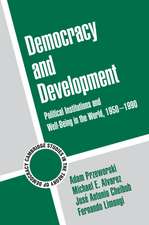Democracy Challenged: The Rise of Semi-Authoritarianism
Autor Marina Ottawayen Limba Engleză Paperback – 31 dec 2002
During the 1990s, international democracy promotion efforts led to the establishment of numerous regimes that cannot be easily classified as either authoritarian or democratic. They display characteristics of each, in short they are semi-authoritarian regimes. These regimes pose a considerable challenge to U.S. policymakers because the superficial stability of many semi-authoritarian regimes usually masks severe problems that need to be solved lest they lead to a future crisis. Additionally, these regimes call into question some of the ideas about democratic transitions that underpin the democracy promotion strategies of the United States and other Western countries. Despite their growing importance, semi-authoritarian regimes have not received systematic attention. Marina Ottaway examines five countries (Egypt, Azerbaijan, Venezuela, Croatia, and Senegal) which highlight the distinctive features of semi-authoritarianism and the special challenge each poses to policymakers. She explains why the dominant approach to democracy promotion isn't effective in these countries and concludes by suggesting alternative policies. Marina Ottaway is senior associate and codirector of the Democracy and Rule of Law Project at the Carnegie Endowment.
Preț: 123.49 lei
Nou
Puncte Express: 185
Preț estimativ în valută:
23.63€ • 24.61$ • 19.97£
23.63€ • 24.61$ • 19.97£
Carte disponibilă
Livrare economică 18 februarie-04 martie
Preluare comenzi: 021 569.72.76
Specificații
ISBN-13: 9780870031953
ISBN-10: 0870031953
Pagini: 256
Dimensiuni: 152 x 229 x 16 mm
Greutate: 0.43 kg
Ediția:New.
Editura: Brookings Institution Press
Colecția Carnegie Endowment for Int'l Peace
Locul publicării:United States
ISBN-10: 0870031953
Pagini: 256
Dimensiuni: 152 x 229 x 16 mm
Greutate: 0.43 kg
Ediția:New.
Editura: Brookings Institution Press
Colecția Carnegie Endowment for Int'l Peace
Locul publicării:United States
Notă biografică
Marina Ottaway is a senior associate in the Democracy and Rule of Law program and director of the Carnegie Middle East program at the Carnegie Endowment for International Peace.
Descriere
During the 1990s, international democracy promotion efforts led to the establishment of numerous regimes that cannot be easily classified as either authoritarian or democratic. They display characteristics of each, in short they are semi-authoritarian regimes. These regimes pose a considerable challenge to U.S. policymakers because the superficial stability of many semi-authoritarian regimes usually masks severe problems that need to be solved lest they lead to a future crisis. Additionally, these regimes call into question some of the ideas about democratic transitions that underpin the democracy promotion strategies of the United States and other Western countries. Despite their growing importance, semi-authoritarian regimes have not received systematic attention. Marina Ottaway examines five countries (Egypt, Azerbaijan, Venezuela, Croatia, and Senegal) which highlight the distinctive features of semi-authoritarianism and the special challenge each poses to policymakers. She explains why the dominant approach to democracy promotion isn't effective in these countries and concludes by suggesting alternative policies. Marina Ottaway is senior associate and codirector of the Democracy and Rule of Law Project at the Carnegie Endowment.


















